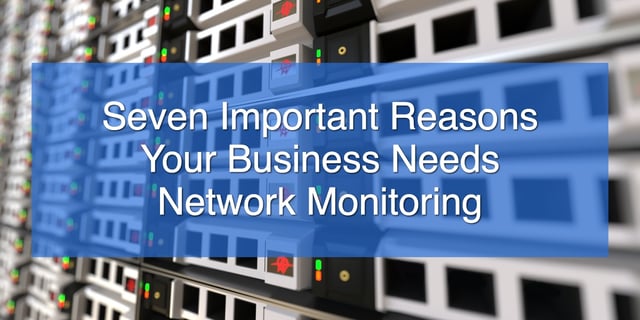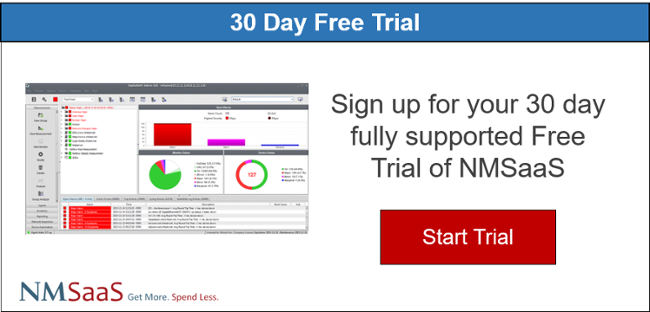Over the last several decades, the number of technical assets a modern company needs has multiplied several times over. Back in the 80s, if you even had a computer, all you needed was a phone, a modem, a desktop, and an ancient EMS or spreadsheet program to track your customer information and finances. These days, you need a website, a mobile app, a social media presence, a company network with dozens of individual computers (depending on your company size) and hundreds of optional tech like networked printers or security cameras. Honestly, with all these devices, applications, online platforms, and services to keep track of, it's no wonder hackers are having a field day. Even the most talented and capable sysadmin in the world can't personally keep track of every single technical asset in a company.
Which is, of course, why we've also come up with so many networking assistive technologies from dashboards to SaaS outsourcing of certain tasks to ensure that no one person, or even one department, gets overwhelmed with the vast number of technical responsibilities involved in even a small modern business. Among the firewalls and document management platforms, there is one service that can help your IT staff more than almost any other called network monitoring.
The concept of network monitoring is simple enough. The software keeps a close eye on every aspect of your network from the temperature of your local servers to the speed performance of your web page. In other words, network monitoring can serve as the eyes and years of your sysadmins. Once it's set up and a skilled IT team is managing the monitored data, there's very little limit to what you can achieve.
1) Detecting Problems Immediately
The first and most obviously useful application of network monitoring is the ability to detect issues the moment they occur. Network monitoring can eliminate the problem of undetected errors because the monitoring software can be configured to send an admin an alert the moment an error occurs. This gives your team the best possible chance of locating, troubleshooting, and solving the issue immediately, and hopefully long before a customer or client has a chance to encounter it. Network monitoring can detect both public website errors and internal errors. In fact, it can detect and send an alert about anything an admin decides needs to be watched including server load levels and system heat which could cause a physical crash at no fault of the software.
2) Predicting Future Issues
Another great use of network monitoring is the ability to see patterns in the data and predict future problematic behavior. If, for instance, if a particular program is for some reason taking more resources every time it runs, this could be a sign of a leaky piece of code, excessive logging, or a large cache that isn't clearing itself. Network monitoring can identify this kind of behavior allowing your technicians to investigate and solve before the growing program can crash a server by demanding too many resources at some point in the future.
3) Tracking Your Many Web Applications
These days, every company needs at least a website and an app and many companies that offer online services do so through a selection of unique web applications. Keeping track of one app is challenging enough but a whole array of applications with hundreds of customers using them is even more delicate. Naturally, you want to ensure that every one of these web applications is performing optimally and is available at all times to your paying customers and the best way to do that is to keep an eye on your collection with network monitoring. Even if your website is hosted on the cloud, your network monitoring service can target the cloud virtual servers and monitor them as well.

4) Watch Out for Hidden Malware
No one's firewall is perfect and hackers are getting more clever by the day. This means that while you may be doing everything in your power to keep the cyber attackers at bay, malware can still slip onto your system. The sneakiest malware doesn't strike like ransomware or spam up your workspace like adware but instead lurks quietly eating your resources and doing something nefarious. Sometimes they send emails from your IP address, risking getting you blacklisted, but the latest hacker craze is to target your databases full of customer personal information and on-file credit card numbers. That said, the resources used by the malware and the packets it tries to send back to its master can be detected by network monitoring which will then allow your technicians to hunt down and eradicate the unwelcome program.
5) Ensure Your Website Uptime
Availability monitoring is one of the unique subsets of network monitoring and specifically applies to keeping an eye on a public website. The availability monitoring feature sends a regular ping to your website. If that ping ever returns with an error rather than a success, this means something has gone wrong with the website and an admin will be alerted immediately, ensuring that your site is never down for long and backup maneuvers are put into place the moment something fails. Network monitoring can also keep an eye on the website server's load performance, giving you a heads up if page load slows down too much or if an unusual amount of traffic is about to overload your allocated resources and put the site's availability at risk so you can find solutions before an error even occurs.
6) Regulation Compliance
Almost every existing industry has a set of data privacy regulations to worry about. Healthcare professionals need to worry about HIPAA, European and international businesses need to worry about the GDPR, and merchants of any stripe who process credit or debit cards (ie: everyone) should be concerned with achieving and maintaining the PCI-compliance standards. While network monitoring does not actively close any security holes, it can be configured to tell you exactly when, where, and how any data on your network is accessed, referenced, or transmitted. If your goal is to keep client and company data safe from intrusion and prying eyes, network monitoring can even give you a heads-up any time someone tries to access the portion of your network where sensitive data is encrypted and stored. If the activity is unauthorized, network monitoring gives you the best chance to catch and prevent data security breaches before they happen.
7) Planning to Expand
Finally, network monitoring can help you plan for an expansion. Whether you're adding a few new servers or an entirely new office location, network monitoring can tell you where the network infrastructure stands now and how to expand to get the best possible performance from the newer, bigger network. It can reveal where you need more resources, give you a baseline on how to double what you already have, and even show a few vulnerabilities that could be closed and improved during the expansion process.
These days, how you manage your network is closely equated to how you manage your company. Naturally, you want to see problems coming miles away and, if anything does come as a surprise, to be ready to respond the moment a website or server goes down. Network monitoring software on its own is a powerful tool, but when combined with a dedicated team of admins to configure your monitoring, respond to alerts, and draw conclusions from pattern data, you'll be able to stay completely on top of the massive collection of business technology and barely lift a finger.


